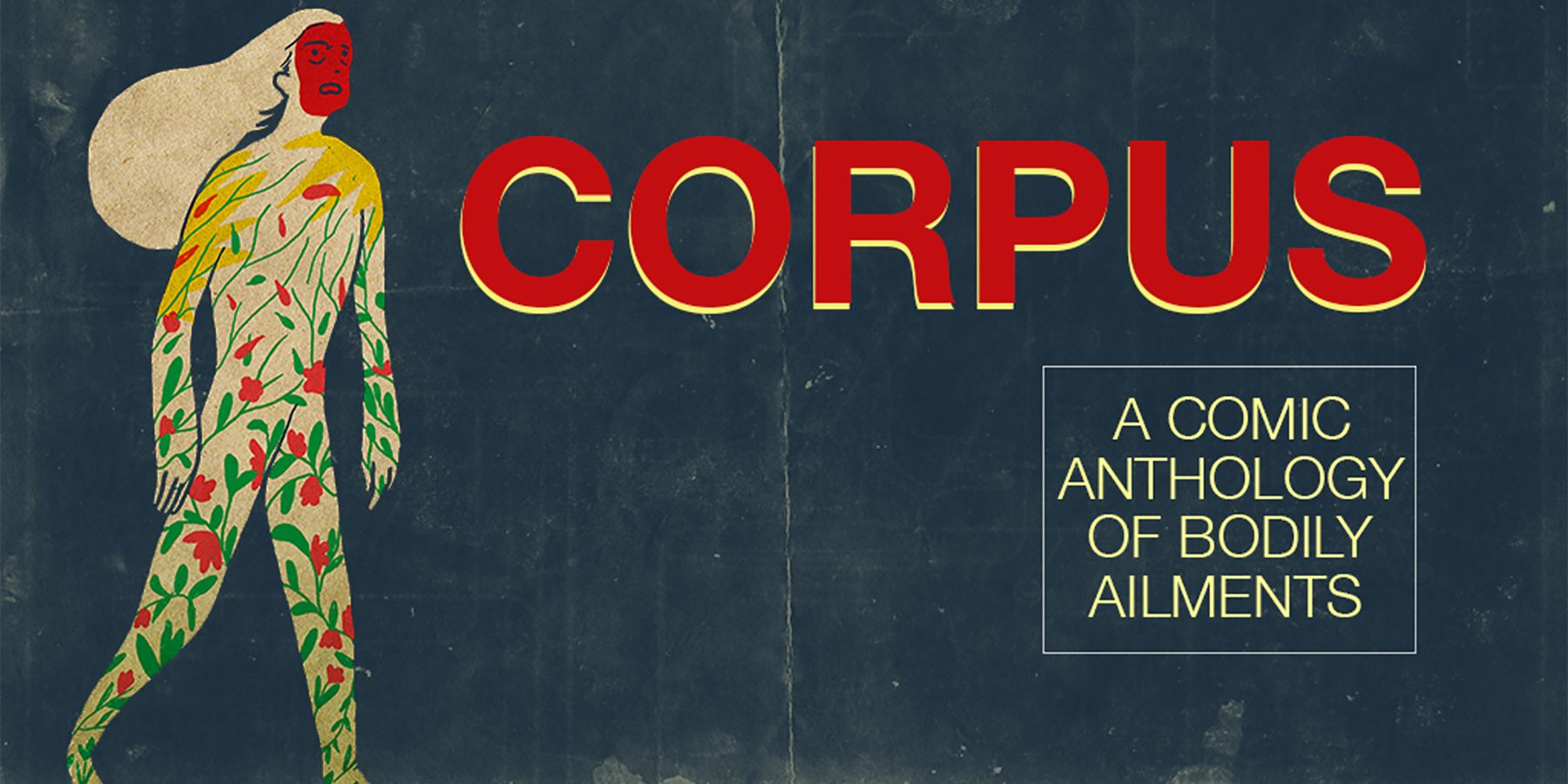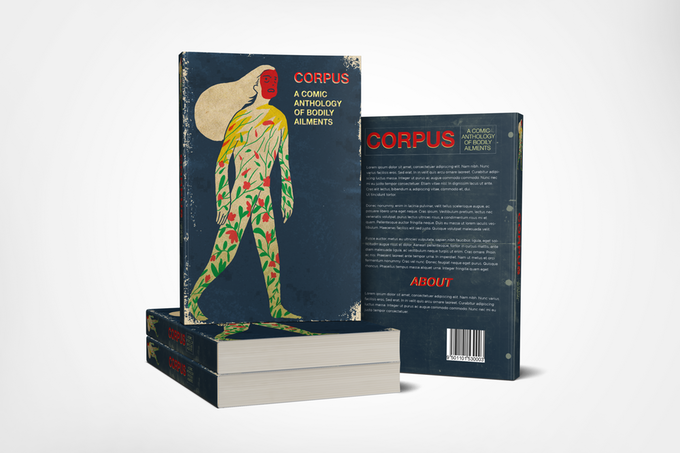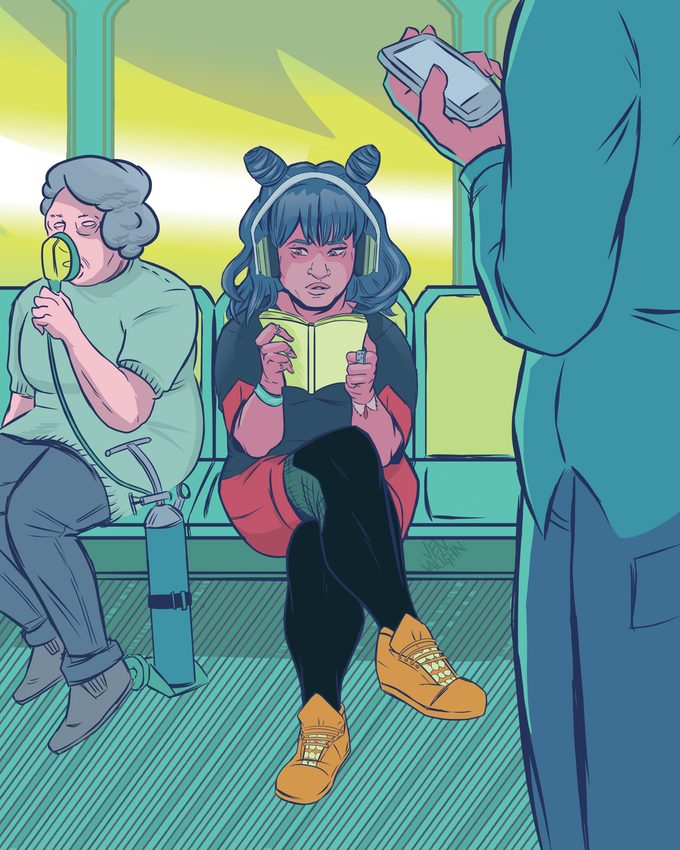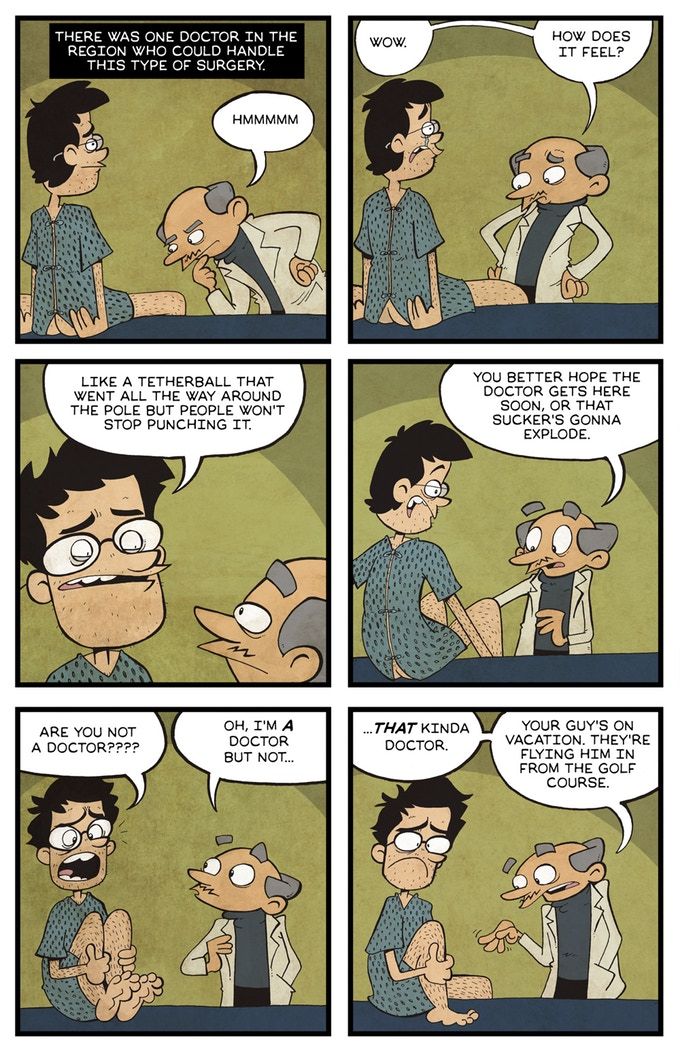Corpus: A Comic Anthology of Bodily Ailments is one of those projects you hear about and wonder why it's only now being made. The anthology contains 40 stories by new and established creators (including Christopher Sebela, Vita Ayala and Tina Howard) about living with physical and mental illness -- everything from allergies to chronic illness to struggling for adequate healthcare.
In superhero comics, it's common for the hero overcomes illness or disability through a miraculous transformation that also grants them powers. So are comics where the hero is "brought low" with a temporary disability that he must overcome through hard work. Think Steve Rogers being cured of his vague assortment of chronic illnesses to become Captain America, or Bruce Wayne's back being broken in "Knightfall" so he could come back stronger than before. In superhero comics, physical health is its own kind of heroism.
Mental health struggles, meanwhile, are too often mined for high drama. Tony Stark falling off the wagon is a great excuse for yet another redemption arc -- but few Iron Man writers have incorporated his AA meetings the character's ordinary, daily life. Comics about people just living with illness that don't lean on harmful stereotypes? Those aren't so common.
Corpus isn't a book of superhero comics. But how the genre treats illness and disability is exemplar of how it's treated culturally: depicted when convenient for drama, but otherwise magically cured or forgotten. We desperately need better representation of people who live with chronic illnesses and disabilities. But we also need broader and more nuanced depictions of physical and mental health. We need stories that don't shame; stories that don't associate illness with weakness, or health with strength and moral good. That's why Corpus is so exciting.
RELATED: The Apocalypse is Floral in The Wilds, Complete with Flower Zombies
As Corpus editor Nadia Shammas puts it, "Everyone’s been sick at some point, some for short periods, some for their entire lives. We are all united by the fact that we navigate the world with our bodies, and it deeply affects the way we exist. Everyone has a story. Stories have the power to spark empathy. These stories of illness connect us, remove the fear of the disabled and the unknown. After all, health is a funny thing like that. Most don’t really think about their own health until it’s compromised."
The anthology is in it's final stretch on Kickstarter -- as of publication, it has met its $25,000 goal, with fundraising continuing until Sunday at midnight, eastern time -- so I sat down to chat with Shammas, and contributors Emily Pearson, Ryan Cady, Cathy Leamy and Eliot Rahal about their work on the book, and what they hope the project achieves.
CBR: Why were you interested in being a part of Corpus, and how have you found working on your story? Has it been easier or harder than you expected to create a comic on this topic?
Nadia Shammas: The idea for the anthology came out of a few different things at once. I had just lost my first job out of college and decided I was ready to embark on my first major self-published passion project. Around this time I was also really preoccupied with the healthcare discussions regarding repealing the Affordable Care Act. I noticed this trend where people with illnesses were being really dehumanized and discussed as though they were a small group of lazy moochers who wanted to take money from the healthy. It couldn't have been further from the truth, and it was really strange to me that one of the only things we can be sure of in life is the fact that we all get sick. I thought, "If they knew me, knew my story as a Type 1 Diabetic, they wouldn't think this way." Then the thought came, how could they know my story? No one tells it. Diabetics are the bookend of a fat joke and not much more.
It hit me how little representation illness actually gets, and so I realized not only did I need to create the content I wanted to see, I needed to do it immediately. I was ready to launch something, but I also wanted to get these stories out there as soon as possible as while this administration is in office, healthcare will continue to be at risk.
Emily Pearson: I was initially interested in being a part of Corpus because of Nadia, and the writer I’m working on my story with, Stephanie Cannon. Nadia and Stephanie are both amazing people and creators, and working with them is something I knew I would enjoy. Having a comic anthology about mental and physical illness is something that’s so personal for everyone involved, and I was really interested in seeing all the stories coming out from my other friends working on the anthology as well.
Ryan Cady: At first, I wanted to do a more autobiographical piece - 2017 was an awful year for my health, with some terrible depression/anxiety issues and my cubital tunnel syndrome making basic writing work difficult somedays -- but after a couple drafts the personal stuff just felt too maudlin, untouchable. So instead, artist Phil Sevy and I took the feelings behind our health (and mental health!) issues from comics work and put them into this more fantastical piece.
Cathy Leamy: I’m a cartoonist who specializes in health and medical topics, so the Corpus anthology is definitely on my wavelength! What’s challenging is figuring out how much educational detail to include. The comic I’m collaborating on is about Dupuytren’s disease (also called Dupuytren’s contracture), a hand condition where the fingers can wind up permanently bent. It's common, but there's not a lot of awareness around it. So, we want to explain the disease (what it is, who’s at risk, what the treatments are), but we don’t want to barf up an entire textbook full of facts. We’re still telling a story here.
Eliot Rahal: Nadia is young and excited about comics. Something desperately needed in comics right now. She has hope for the future. It’s clear that she wants to help make this world a better place. Corpus is living proof of that. How could I not want to be a part of that? Working with Sean is great. His art is cosmic. It has an interdimensional quality to it. It allows us to get weird in a create something really beautiful. Also. He is a fellow studio mate and friend. We can work on this together in the same room. That can be rare sometimes. So it’s really cool to be able to feed off of each other's ideas.
Page 2: [valnet-url-page page=2 paginated=0 text='Lessons learned from Kickstarter, hopes for future representation']
What can you tell me about your story and what you hope to achieve with it?
Pearson: I’m doing the art for Stephanie Cannon’s story, so I’m mainly just gonna sit back and let her work her writing magic, but I really hope it connects with someone, and that we can relate to readers on a personal level. As far as what it’s about, I’m not sure how much information Stephanie would be OK with me giving away. It’s a very emotional story that focuses heavily between the relationship of a patient visiting someone in a hospital.
Cady: In a perfect world, I could call the piece "Gaimanesque" and not groan at myself. It's a dark fantasy piece about a comic book artist with a monster in his studio, a monster that he has to feed with suffering and physical ailments as he works. If we did it right, it'll be bleak and a little beautiful and resonant with anybody who's hurt for/from their work.
Leamy: My story is a collaboration with my mother, Judy Leamy. I’m so psyched for the chance to work with her and to make a narrative out of her experience with Dupuytren’s.
Both of us are also eager to bring attention to the condition. Along with other creators in Corpus, we want to remind people of the holistic aspects of illnesses. It’s often not just a physical thing about the body and pain; it’s also about how others perceive you, the effects on day-to-day routines, and the impact on activities that give your life meaning. The bent fingers and discomfort from Dupuytren’s, for example, affect basics like shaking a stranger’s hand and great big things like making music and artwork.
Rahal: I’ve seen so many people I know about rage against growing older. Aging is a natural, unpreventable ailment. One we all experience. One we all share in. One that can leave us all scared, alone, and feeling isolated from the world. It’s something important to me. I’m really looking forward to telling this story.
Nadia, can you tell us a bit about the process of putting together the book? How did you choose submissions? Was there a long editing process, or was your role more curatorial?
Shammas: I opened submissions online and also did a lot of promotion of the book at NYCC. I approached many creators who I respect and admire immensely and asked them to submit their stories, and many of them agreed. I would say I have about an even split between submissions received online and creators I asked to contribute. While choosing submissions, I wanted to represent the greatest range of stories, art styles and tones.
The thing about illness is that it's both universal and completely personal. Everyone gets sick, but no two people with the same sickness will describe or experience it the same way. With a topic so broad, I did my best to have such variety that anyone who picks it up will recognize something shared in it. I also wanted to make sure I gave an even split between mental illness, physical illness, healthcare experiences, stories about disability or chronic illness, hospital stays, medical debt, and so on.
It took a long time to pick everything, as the submission response was huge and there were so many great stories to choose from. I would say that as of now my role has been curatorial, but I will begin the editing process as soon as the Kickstarter ends.
RELATED: 7 Things Comics Creators Need For A Successful Kickstarter Campaign
Putting together a comics anthology and Kickstarting it is a huge undertaking. What have you learned from the project?
Shammas: I've learned a ton from this project! I've learned the entire process of putting together a book, and it was so much work. This is my first project as well. The biggest thing I've learned was collaboration. I tend to try to take everything on myself, but I really had to learn how to lean on others. I couldn't have done any of this without the incredible expertise of my more seasoned collaborators, and I feel so honored to work with them and learn from them. Everyone on my book has brought me an amazing lesson.
The other major lesson I learned was that, even though I had some idea of how many people live with invisible illnesses, I didn't know the half of it. I've heard stories from people I would have never guessed. If people knew, shared, and were more empathetic with each other, I can't imagine people could support a system where the sick are left out to suffer alone. Hopefully Corpus is the beginning of that conversation.
Picking up from that -- popular stories of physical and mental illness and disabilities often rely on cliché and hoary stereotypes. Do you think a book like Corpus can help move the needle in terms of future representation?
Pearson: Absolutely! There’s a huge variety of stories in Corpus. The creators on this book are tackling many different illnesses in many different genres of stories. A lot of the stories in this anthology are very personal to their creators, and it makes a huge difference in the outcome of the book.
Cady: Absolutely. The talent Nadia's assembled is top tier, and at the time we're living, health care being what it is (especially in the States), there's a lot to be said. But also... our bodies breaking down, our physical limitations? That's universal, and these creators being open and earnest with their stories makes for something special.
Leamy: Yes! Books like Corpus serve as reminders of the real people and real experiences behind the media clichés. They can also be outreach to people who have those conditions themselves, reminding them that they’re not alone and that others out there understand them beyond the cheesy stereotypes.
Rahal: All I know is that we don’t try, nothing will happen. Not to be a cliché, but we need to be change that we see in the world. So, yes. I have to believe that if enough people like Nadia exist, and enough people start telling these stories, that maybe we can push the world into being a better place.




